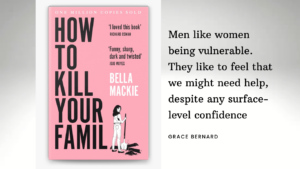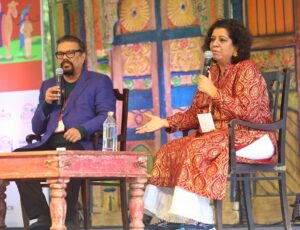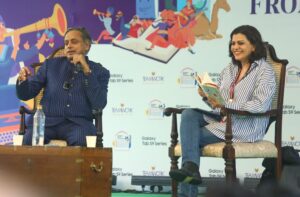Into the Mind of the ‘American Prometheus’: Kai Bird on Oppenheimer
4 min read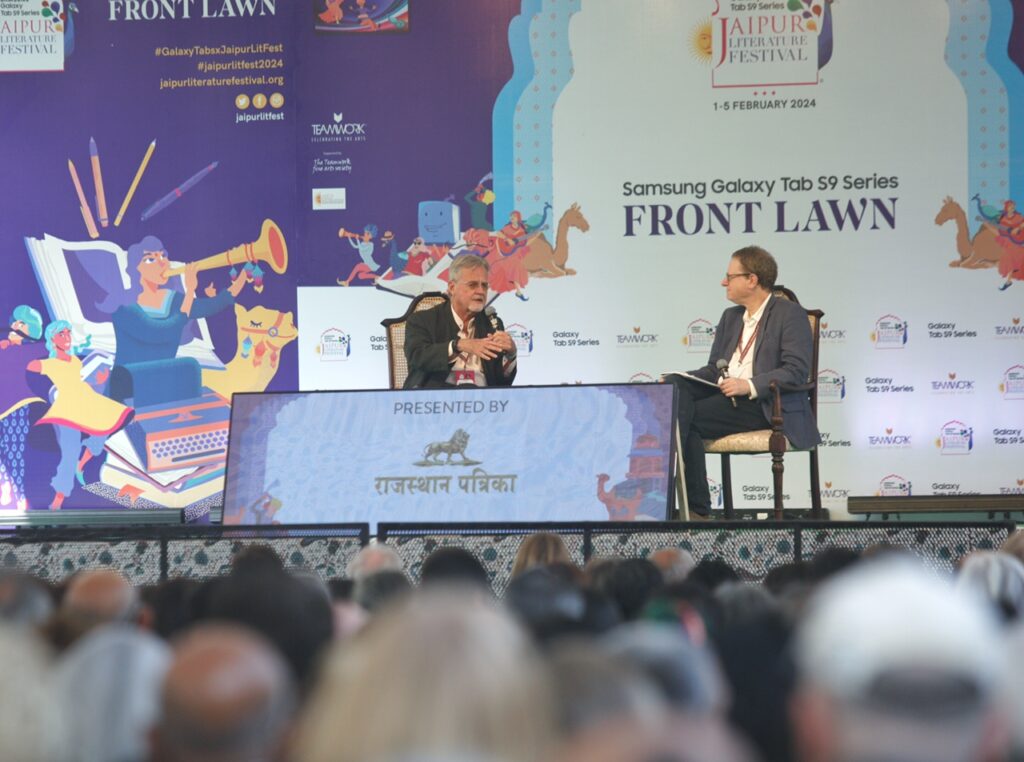
Kai Bird and Jonathan Freedland speak about Oppenheimer: The American Prometheus. Pic by Sunil Sharma
As explosive as the subject of his book, Kai Bird’s interaction with Jonathan Freedland kept the audience hooked for an hour as the Jaipur Literature Festival (JLF) opened on Day 3. The Front Lawn buzzed with nuclear energy as the two delved into Oppenheimer: The American Prometheus, brought into the limelight further by Christopher Nolan’s cinematic masterpiece, Oppenheimer.
Oppy: A tapestry of complexities
Bird reflected on the physicist J Robert Oppenheimer’s role in ushering in the atomic age, emphasising its continued impact on our precarious world. Beyond being a quantum physicist, Oppenheimer’s life was a tapestry of complexities, blending love for the Bhagavad Gita, Sanskrit, Eliot’s poetry, and polymathic pursuits.
In the book, Bird has charted Oppenheimer’s pivotal life arc — from his triumph as America’s most celebrated scientist in 1945 to his downfall and humiliation during the McCarthy era, offering insights into contemporary American politics. Bird shared his insights during the morning session. “You know, when the movie came out, I saw Christopher Nolan repeatedly quoting that Robert Oppenheimer was the most important man who ever lived. And I thought he was exaggerating, but I realised Oppenheimer is the one who gave us the nuclear age, the atomic age that we’re still living with, that we’ll always be living with, in this very dangerous world balanced on the precipice of Armageddon. And that he’s important that way and his story is just complicated.”
Freedland asked Bird if he considered Oppenheimer a better scientist because he could quote in Sanskrit, and read and write poetry. “Yes, he was a better scientist because he was a better human being and a polymath. He was also interested in the human condition,” Bird quipped.
Why Prometheus?
When a member of the audience asked, ‘Why Prometheus,’ Bird revealed that he did not intend to use it, in the first place. “Prometheus was the Greek mythical god who allegedly stole fire from Zeus and gave it to humankind. And then was punished for it by Zeus, hung up on a cliff where a giant eagle would every night dig out his liver. It is a great metaphor for Oppenheimer’s life,” he shared.
Bird and his co-author, Martin J. Sherwin, however, had used the working title ‘Oppy,’ which was Oppenheimer’s nickname. “I got a call from my editor who told me that the marketing people would not be able to sell a book titled Oppy. I had two days to come up with a new title. My wife Susan suggested the name ‘American Prometheus’. I said nah, people don’t remember their Greek gods anymore. That’s too obscure. The next morning, my co-author Sherwin called me excitedly quoting the same idea. And I told him that I needed to apologise to my wife,” he shared.
The father of the nuclear bomb
Oppenheimer, the creator of the atomic bomb, faced a moral dilemma and rationalised the use of the bomb on Hiroshima as a necessary evil to prevent future nuclear conflicts. “He’s a very complicated man, who understands hard truths and becomes convinced that the weapon had to be used in combat and if it wasn’t in this war, humanity would not understand what a special different weapon it was,” said Bird.
On the portrayal of this complexity in Nolan’s film version, Bird said that the internal struggle is portrayed cinematically in a powerful scene where Oppenheimer experiences the aftermath through his emotional reactions. “You see the emotional Oppenheimer’s reaction to that and that forces the audience to imagine for themselves what it was like. There is another scene where he is giving a victory speech and sees a young woman’s face melting. You’re seeing him struggle with the consequences of his actions in his mind and that’s very powerful cinematically,” he shared.
Is the rise of AI another Oppenheimer moment?
In the context of the question of a scientist’s accountability, Freedland raised the very relevant question of the use of artificial intelligence. “If people want to be true to the lessons of the Oppenheimer story, what would they do with AI? Will they stop the work, because they’ve learnt that once you have invented this thing, you cannot put the genie back in the bottle?” he asked Bird.
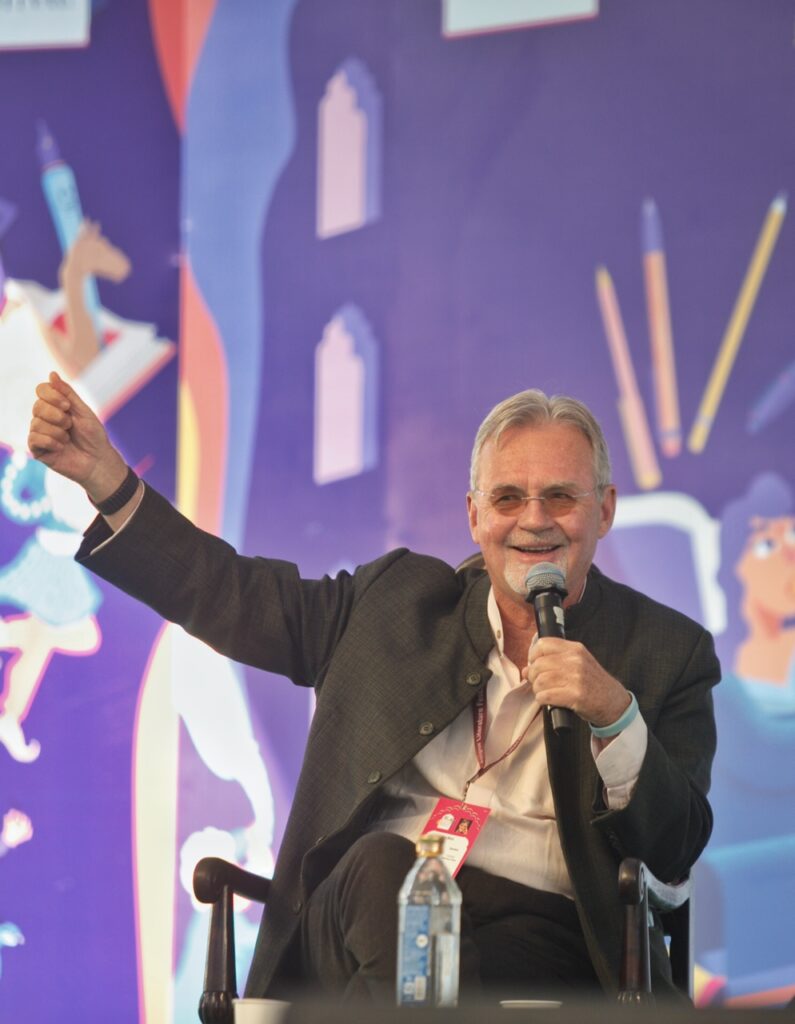
Oppenheimer always said that you can’t stop science. You can’t stop human beings from trying to figure out the physical world around them, but you can try to learn from the science and you can make choices on how to use this technology.
Kai Bird on the use of AI
“Oppenheimer always said that you can’t stop science. You can’t stop human beings from trying to figure out the physical world around them, but you can try to learn from the science and you can make choices on how to use this technology,” said Bird. He drew attention to Sam Altman’s insistence on stalling the work on AI, calling it another ‘Oppenheimer moment’. Bird said that there need to be firm rules about privacy in the case of AI. “We need to find a way to regulate it and humanise it. And make sure if it is going to take jobs away from truck drivers, we need to do it gradually and find a way to retrain the truck drivers to do something else. There is a lot of social engineering that will have to be done!”
Bird also said that Oppenheimer’s approach, often criticised as naive, reflects a belief in the simplicity of solutions to complex problems. His reliance on naivete as a strategy suggests a faith in the power of straightforward and uncomplicated solutions to address the intricate challenges he faced.
